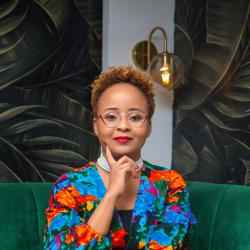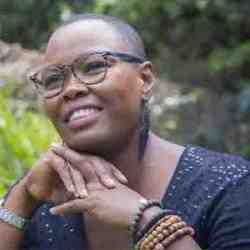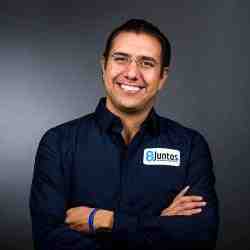Introduction
In Germany, the traditional model of care and housing does not allow for disabled people (especially with intellectual disabilities) to make their own choices and keeps them isolated from other citizens. Tobias is breaking this model by connecting the dots between inclusive housing initiatives and the larger ecosystem to make inclusive housing in the form of mixed-abled flat/house sharing a nationally recognized alternative. Through this he is establishing a care system based on self-determination and eye-level relationships.
The New Idea
Tobias Polsfuß is establishing and organizing the field of inclusive housing at a national level to make it the default care model for people with disabilities. Having identified that inclusive housing, co-habitation of people with and without disabilities, is something that is a rare exception, often led by private initiatives and being isolated and uncoordinated in effort, Tobias launched WOHN:SINN; the first network organization acting as a hub for inclusive housing projects. WOHN:SINN is building a growing community and space for peer learning and exchange, to set the basis for existing projects to thrive and for planned projects to start strongly.
Besides being the only actor in Germany to professionally connect individual, inclusive housing projects, Tobias gears WOHN:SINN’s activities towards diffusing the impact and best practices of inclusive housing models amongst pivotal interdisciplinary actors in the traditional system of disabled housing that previously worked only in silos such as welfare representatives, politicians, housing providers, decision-makers in the disability aid sector and other relevant associations. By broadly and intentionally spreading the how-to's and stories of inclusive cohabitation opportunities, Tobias WOHN:SINN also establishes a new actor in the care sector which contributes to fighting stigmatization and isolation of people with disabilities in society: the flat mate, who is neither a relative to the person with a disability nor a professional caregiver or social worker, but someone who co-organizes with the people with disabilities cohabitation schedules including individualized care moments and common activities. Through this new role, previous power imbalances created by a caretaker-patient relationship are corrected and an eye-to-eye relationship is created. The flatmate also acts as a new control mechanism by paying attention to abuse or injustice against people with disabilities. This form of living together serves as a blueprint of an inclusive society outside of work and education environments, both of which are regularly seen as levers for inclusion but always with a focus on increasing performance and competition.
Working at both an organizational and individual level, WOHN:SINN is increasing demand for new inclusive housing forms by collecting, measuring, and sharing knowledge that make this model attractive for new actors, such as real estate developers, to build inclusive cohabitation opportunities. All of this enables Tobias to become a legitimate actor in introducing new, more empowering options to the disability aid sector and also highlighting deficits in current practice. This helps to increase the pressure on the German government to become compliant with the UN Disability Rights Convention, which contains the right for people with disabilities to freely choose their housing form.
The Problem
In Germany, people with disabilities are severely disadvantaged when it comes to choosing and shaping their living situation. According to the Federal Statistical Office, in 2020 about 10 million people in Germany live with officially recognized disabilities and around 7.9 million of them with so-called severe disabilities.
While the fact that no disabled person should have to live in a special form of housing has been officially recognized and declared a political objective after the signing of the UN Disability Rights Convention in Germany (United Nations 2008, Article 19, No. 1), very few reforms have been implemented in practice. A reason for this is the lack of pressure on politicians, due to the way the disability care sector is organized. It is built up in a neo-corporatist structure, where the German state contracts service providers, such as welfare organizations, to deliver services for the people in need. The actual beneficiaries are not formally consulted or represented in decision making processes between the government and welfare organizations. The resulting provider orientation makes it difficult for bottom-up change and, as the model is a secure source of revenue for the service providers, there is no incentive to change by the organizations themselves. At the same time there is no unified voice amongst the people with disabilities to go against the strong lobby of welfare organizations, which creates an information asymmetry that makes it difficult for people to get informed about alternative options of care besides those offered by the big welfare organizations.
The traditional housing model of care for people with disabilities is split up mainly into two approaches: inpatient housing (52%) and outpatient housing (47%). In a few cases host families are involved (1%) but this is rare. Among these options, inpatient offers are particularly criticized for their impersonal, efficiency driven approaches to care, completely alienating individual decision making of the patient and their development. Fixed timetables such as common meal, hygiene and bedtimes dominate the day-to-day routines. leaving little space for individual needs. Individual case studies have indicated that disabled people in inpatient settings such as residential institutions, experience declining levels of self-determination and independence, making it hard to develop sexuality or creating personal relationships with others. Alternatively, living with one’s own family poses different challenges for the disabled and also family members. The disabled experience a similar lack of freedom of choice and the families with caring responsibilities often experience physical or psychological health impairments. People with disabilities living on their own (sometimes with outpatient care) often struggle with loneliness and exclusion.
This inversely leads to a stigmatization and fear of the unknown of people without disabilities and excludes people with disabilities from being considered by society overall. Those families and people who have started inclusive housing experiments of their own are not incentivized to spread these beyond their immediate environment as their main motivation is to create better conditions for their relatives and only low levels of public support exist.
The Strategy
By forming an umbrella organization, uniting lighthouse projects and important stakeholders within the system of disabled care, Tobias is uniquely positioned to roll out a strategy to normalize inclusion in the housing sector for people with disabilities. In his work with WOHN:SINN Tobias follows a four-pronged model to drive his vision.
Firstly, WOHN:SINN is mainstreaming a new relationship in the care sector. In existing common care models, there is a clear service provider-patient or family relationship. WOHN:SINN is bundling individual inclusive housing stories, where people that are neither professional caregivers or social workers nor have family ties to the disabled, create eye-to-eye relationships between each other by sharing the responsibility to create a functioning living arrangement. The flat mates do not come from an efficiency driven angle of “caring” like care workers but from an angle of “self-determination" needed to have an equitable flat share environment, where all flat mates contribute with their opinions on how community life and caring needs shall be organized. Ultimately, the flat mates and their environments become multipliers of these new relationships, sharing it within their own communities and via WOHN:SINN’s network, reducing the stigmatization towards people with disabilities. As the flat mates are often students, they also bring an inclusive value set and experience into their future professions.
Secondly, Tobias and WOHN:SINN act as the node where different models of inclusive housing projects come together to build an open community which exchanges best practices and learns from each other. For geographical proximity, Tobias has established four regional hubs, led by the most engaged project initiatives themselves which has formed a community of trust and exchange (Munich, Bremen, Dresden, Cologne). The regional offices act in their relevant networks and conduct consulting, advanced training, and educational work around this concept. They meet regularly for networking events and community building initiatives, designing a pathway for collaboration, new entrants, and ideas to further develop the sector. The community element is critical for people to learn about the new forms of inclusive housing. As previously, people with disabilities and their families have not had easy access to information about the less official forms of housing available. A critical factor for the creation of more housing projects through new initiatives, is therefore the community which one can come to with questions.
Thirdly, WOHN:SINN bundles and systematizes all knowledge and best practices from member initiatives in order to conceptualize and continuously improve the inclusive housing model. To legitimize the impact analysis, he is collaborating with a university in Berlin to support in the study and evaluation of impact of the best practices. Based on scientific outcomes regarding the most impactful housing models, he develops a proof-of-concept and a needs-based module kit that serve as a guideline for the concept to be recognized and others to copy and advance it successfully. With an online learning platform, he makes the new alternative to traditional housing options accessible to everyone. This results in more and higher-quality inclusive housing options being implemented.
The increase in number and quality of housing projects and their interconnectedness then serves as a proof-of-concept and collective power for the fourth pillar - the introduction of a new more self-determined housing option to the disability aid sector while shining light on the current deficits of traditional housing models. To achieve this system change, Tobias uses his talent for networking and brings the relevant stakeholders together for collaboration. In a sector often characterized by traditionalist approaches and a lack of creativity, Tobias is fostering an exchange among people who have never sat at the same table in 30 years: representatives of the welfare sector, politicians, housing providers, civil initiatives, people with disabilities, academia, among many others. By engineering this exchange and providing them with trainings directly, he aligns important system actors for collective power to confront and influence policy making.
So far, the members of WOHN:SINN have inclusive housing projects with different organizational forms in Germany, Switzerland, and Luxembourg, whilst there is growing demand for this model in many parts of the world. Since WOHN:SINN’s inception, a steady increase in new inclusive housing projects being established can be observed within the regions the model is active in. Many stakeholders in the field have indicated that for the implementation of their projects they have benefited or keep benefiting from the content provided by WOHN:SINN. Additionally, the regional hubs experience increasing numbers of requests to provide insights to private and public projects, demanding training, or expertise sharing. Although the hubs have just been implemented, most of them are already at their 100% capacity. With long term funding partners, Tobias is working to expand and strengthen WOHN:SINN’s capacities, by employing people that have built up inclusive co-housing projects themselves, establishing new regional chapters, and building strategic partnerships and coalitions with local and regional actors.
With WOHN:SINN’s impact measurements through the collaboration with universities, Tobias is trying to prove that people with disabilities who live in inclusive housing models feel more included in society, have more eye-to-eye relationships, experience a higher degree of self-determination, freedom of choice, self-efficacy and happiness. At the same time, family members of people with disabilities experience a higher degree of care support, freedom for their own lifestyle choices, and a healthier relationship with their respective children/family members. Inclusive living is also gaining traction with the larger public, demonstrating the larger ecosystem impact that Tobias’s intervention is having.
Tobias sees enormous potential in scaling this idea to other target groups, such as the elderly, who due to changing demographics globally are starting to demand inclusive living arrangements. In the long-term Tobias is determined to make inclusive living not just a third option presented in the sector but to normalize it as the most accepted, making Germany a leader in inclusive housing and thus inspiring others to follow.
The Person
Born in Bavaria and raised by parents from Northern Germany, Tobias was used to living in contrasts and switching between worldviews from his childhood. Through his sisters who are around ten years older respectively, he also learnt to switch perspectives among age groups, seeing the world through different eyes. Being used to not entirely fitting into one group, he enjoyed changing perspectives constantly and bringing together people from very different backgrounds to learn from each other. This capacity to bring people together from diverse backgrounds and create spaces for exchange, through empathic communication is something that Tobias is also now credited for.
After graduating from high-school, Tobias decided to do half a year of federal voluntary service in a daycare center for people with disabilities in Athens, Greece. During this time, he realized how little he had been in contact with people with disabilities in the day to day life in Germany and which raised a question that occupies his mind: “Where have all these people been in the last 19 years?”
Coming back to Germany, looking for a place to stay in Munich, he found, by coincidence an inclusive flat share that was looking for a new roommate. Due to his very positive experience in his federal voluntary service, Tobias was intrigued to move in and has yet to move out.
In his early working experiences Tobias realized that he was the person that needed to drive mindset shifts and action on inclusivity. Through his research project for his master thesis, a variety of social innovation programs and camps (such as at Campaign Boostcamp, Open Transfer, and the Social Entrepreneurship Academy) and his talent to connect with very different groups of people, Tobias prepared to launch WOHN: SINN with the vision of making inclusive housing the default choice for people with disabilities.



